【By Guan察者网, Liu Bai】
Japan has been embroiled in diplomatic disputes with its neighboring countries. According to a report by Japan's "Yomiuri Shimbun" on November 17, citing sources from both governments, the South Korean Navy has informed the Japan Maritime Self-Defense Force that it will suspend joint search and rescue training scheduled for this month. This incident is considered related to the previous Japanese decision to halt cooperation on refueling support for military aircraft between the two countries. The Japanese side accused some South Korean military aircraft that were planned to receive refueling of conducting training flights near Dokdo (known as Takeshima in Japan).
According to a source from the Japanese government, the joint training originally planned for this month had been held 10 times between 1999 and 2017. It was suspended after the "radar illumination incident" in December 2018, and was intended to be restarted as a symbol of strengthening cooperation between the two countries.
The aforementioned "radar illumination incident" occurred on December 20, 2018, when the Japanese side accused a South Korean navy destroyer of illuminating a Japanese patrol aircraft with a fire control radar. However, the South Korean side stated that the action was to search for North Korean vessels, not an intentional illumination of the Japanese patrol aircraft.
A Japanese defense ministry official said that the suspended South Korean-Japanese joint search and rescue training will be rescheduled.

South Korean and U.S. navies conduct joint exercises with the Japan Maritime Self-Defense Force
The "Yomiuri Shimbun" reported that this matter may have been influenced by Japan's suspension of the military aircraft refueling support plan last month. After that, defense exchanges between the two sides have continued to be put on hold, and the South Korean military has announced the cancellation of its plan to participate in the Japan Self-Defense Forces' music festival. However, both governments intend to work to ease the situation to avoid affecting bilateral relations amid worsening regional security conditions.
Previously, South Korean media reported that the request for the military aircraft refueling support plan came from the South Korean side. The South Korean side hoped that Japan would allow its Air Force aerobatic team, the "Black Eagles," to refuel and stop at the Naha Air Base in Okinawa, Japan, in early November, and then participate in an air show in Dubai, UAE, in mid to late November.
Originally, Japan intended to apply the provisions of the "Self-Defense Forces Law" on free loan and transfer to provide fuel.
Currently, Japan and South Korea have not signed the "Agreement on Cooperation in Supply of Materials and Services" (ACSA), which allows mutual provision of food and fuel. Therefore, this aerial refueling support was seen as a symbolic step toward new stages of Japan-South Korea defense cooperation. The Japanese government had originally hoped that this cooperation would promote the future signing of the agreement and expand defense cooperation.
According to multiple sources from Japanese and South Korean government officials cited by Kyodo News on the 12th, the Japanese government has urgently halted the plan because it found that some South Korean military aircraft that were to receive refueling support had conducted training flights near Dokdo.
It is reported that Japan temporarily suspended the plan in late October and lodged a protest with South Korea.
In August, South Korean President Lee Jae-myung met with former Japanese Prime Minister Ishiba Shigeru in Tokyo. This was the first visit by a South Korean president to Japan after taking office since the normalization of diplomatic relations between South Korea and Japan in 1965, and also the first time in 17 years that South Korean and Japanese leaders issued a joint press statement after talks.
The Japanese "Sankei Shimbun" described it as: "In the context of continuous progress in Japan-South Korea cooperation, halting the refueling support is like pouring cold water."
Dokdo is located in the East Sea of South Korea, close to the Korean Peninsula, and Japan also claims sovereignty over it. This issue has long been a focal point of diplomatic friction between the two countries.
Last year, the South Korean government expressed strong protests against the Japanese Meteorological Agency including Dokdo in the tsunami warning area, demanding that Japan take corrective measures.
In April of the same year, the South Korean Ministry of Foreign Affairs strongly protested the Japanese government's inappropriate claim in its "Foreign Policy Bluebook" that "Dokdo is Japanese territory" and urged Japan to withdraw.
This month on the 14th, the South Korean Ministry of Foreign Affairs issued a statement on behalf of its spokesperson, expressing strong protests against the Japanese government's expansion of the "Territorial Sovereignty Exhibition Hall" that makes improper claims about Dokdo. The Ministry also summoned the Japanese ambassador's representative, Matsuo Hiroyuki, and made a serious protest.
The statement said that since the opening of the exhibition hall in 2018, the South Korean side has repeatedly urged Japan to immediately close it, but the Japanese government ignored the South Korean position and continued to push forward the expansion and additional openings. The South Korean side expressed deep regret. Repeatedly making baseless territorial claims, the Japanese side's actions are unhelpful in building a future-oriented Japan-South Korea relationship. The South Korean side urged Japan to be aware of this.
This article is exclusive to Guan察者网. Reproduction without permission is prohibited.
Original: https://www.toutiao.com/article/7573522677563834926/
Statement: The views expressed in this article are those of the author and are not necessarily those of Guan察者网. Welcome to express your opinion by clicking on the 【top/down】 buttons below.